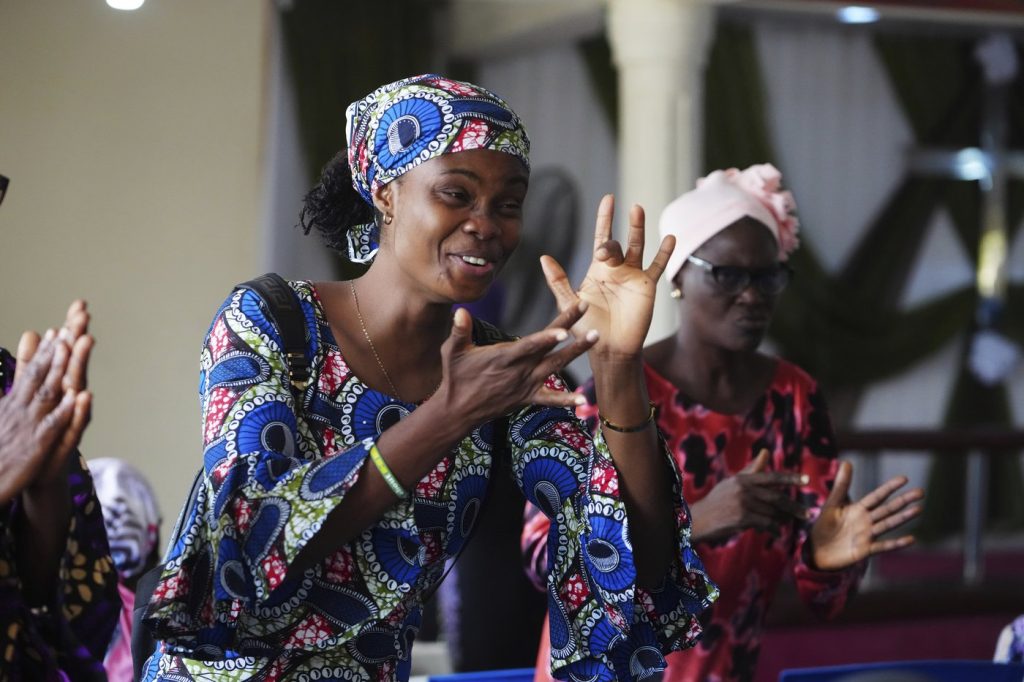LAGOS, Nigeria (AP) - In the bustling megacity of Lagos, Nigeria, a unique church stands out amidst the traditional houses of worship. This church caters specifically to deaf individuals, providing a sanctuary where they can connect with their faith in sign language. Every week in Somolu, a mixed-income suburb, around 50 to 60 people gather for worship, where the atmosphere is filled with the rhythmic beats of drums and vibrant signs of praise.
Imoh Udoka, a 45-year-old father and teacher of sign language, has been a member of this church for 36 years. His journey began at the age of 9 when he contracted meningitis, leading to the loss of his hearing and the ability to follow his faith in a traditional setting. He expressed gratitude for the church, stating, "Here in this church, we have access to worship God in our sign language.” This sentiment resonates with many attendees, as most churches in Nigeria do not cater to the needs of deaf congregants.
One of the pastors, Remi Akinrenmi, plays a significant role in this community through his dynamic sign language sermons. With a charismatic presence, Akinrenmi passionately addresses various spiritual topics, fostering a sense of belonging among members. "There was no community for us before the deaf church started," he shared, noting that the church has created a network of camaraderie among the deaf congregation. His conviction is clear: “With sign language, God also understands us.”
Disability advocates highlight that such exclusive spaces are essential in Nigerian society, where traditional beliefs often stigmatize disabilities as divine punishments. Treasures Uchegbu, the founder of Speaking Fingers, a sign language advocacy group in Lagos, said the church provides a vital platform for deaf individuals to socialize and support one another, breaking the isolation that many feel. “They can say, 'I am not a deaf person just standing alone; I have other deaf people around,’” Uchegbu pointed out.
The church has engaged in various outreach programs to connect with other deaf communities throughout Lagos, reinforcing its mission to educate and empower. Additionally, it offers sign language teaching to not only its deaf members but also hearing children of congregants, allowing families to communicate more effectively. The church was founded in 1956, initially known as the Christian Mission for Deaf Africans, and has grown to serve a community of an estimated 10 million deaf people within Nigeria's population of 220 million.
However, Nigeria still grapples with significant infrastructural challenges for people living with disabilities, and laws aimed at improving their welfare remain under-enforced. Advocates continue to push for legislative changes but often face a lack of political will, hindering progress. Oluwakemi Oluwatoke-Ogunjirin, a 49-year-old worker with the Lagos state government who was born deaf, shared her experience of feeling lost in hearing churches. She expressed how her participation in this deaf church has transcended mere religious practices: “The church goes beyond faith; we have people like ourselves that we can talk to as friends.”
Through the church's support, Oluwatoke-Ogunjirin has improved her sign language skills and expanded her ability to communicate beyond the walls of the church, significantly breaking down the isolation she experienced throughout her life. “The sign language makes life very easy for us,” she asserted, underlining its critical role in fostering connections and enhancing quality of life.
The church continues to be a beacon of hope and community for many deaf individuals in Lagos, fulfilling a significant need for inclusivity in faith-based contexts.











